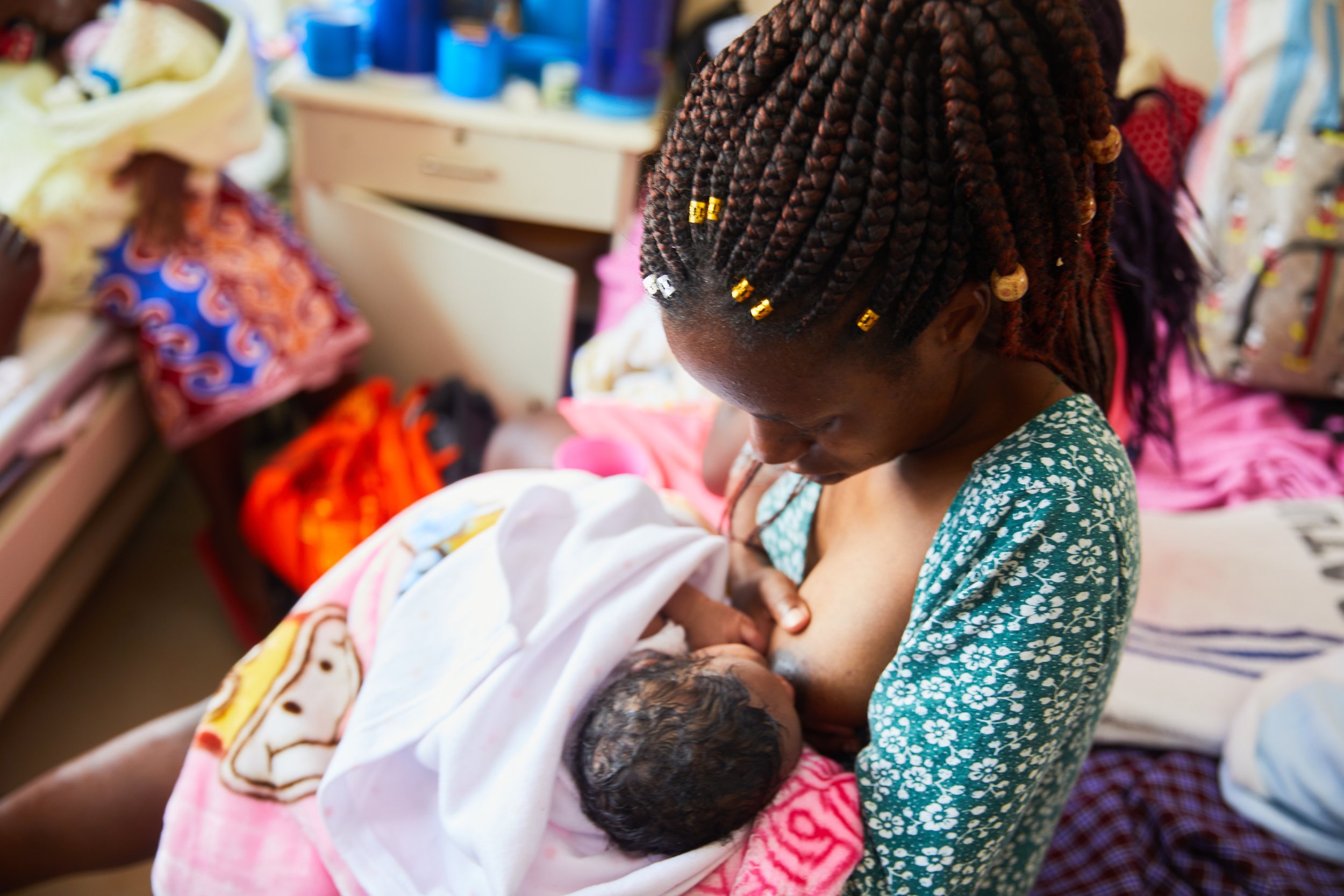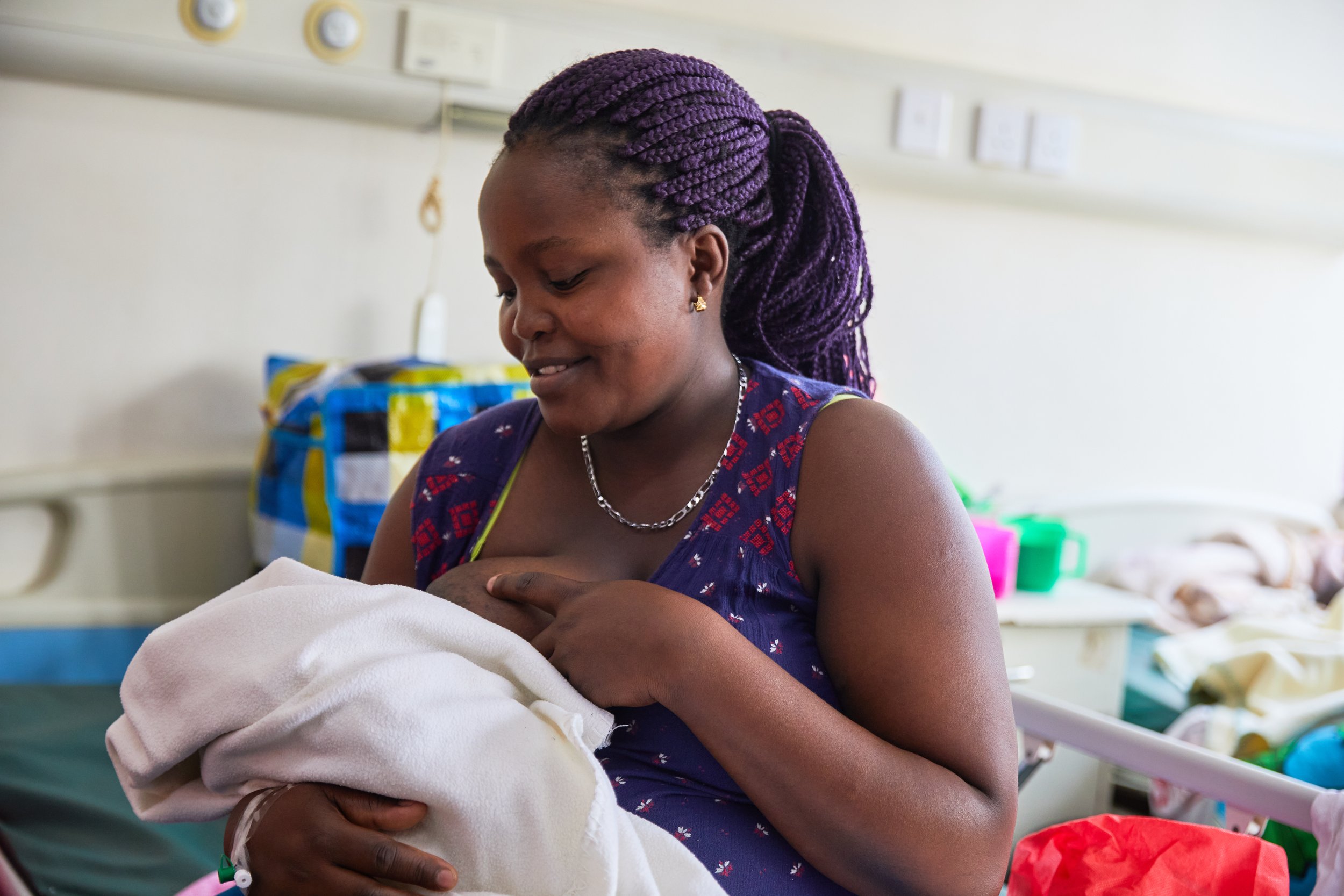When Esther gave birth to a baby boy, the first few days were a little overwhelming. She was sore from delivery and, as a single parent, saw the coming unsupported months as a challenge. She’d received lots of advice from neighbors about breastfeeding – such as giving gripe water to crying babies or introducing porridge after a month – but much of this was conflicting.
Luckily, Esther had enrolled in PROMPTS at her local clinic shortly after delivery. The messages she received from the platform since had been a lifeline; advising her on the practical ‘how-to’ and when of breastfeeding, and encouraging her to stick with only breastmilk for the first six months. At the six month mark, her little boy was growing healthily.
The benefits of exclusive breastfeeding
Exclusive breastfeeding, where a baby receives only breast milk, is a proven keystone to improved survival, growth and development in the critical first six months of life. Breast milk contains essential hormones, antibodies, and a delicate balance of protein, sugar, fat and vitamins, offering exclusively breastfed infants great nutritional advantages and stronger protection against infectious diseases.
Yet, according to 2020 data, only 61% of children under six months in Kenya are exclusively breastfed, lagging far behind the WHO-recommended rate of 90%. Across the country, a number of factors continue to affect the breastfeeding rate; including mothers – especially first-time mothers – lacking access to basic information, cultural taboos surrounding public breastfeeding and colostrum (the first form of breastmilk), and socio-economic factors such as long working hours and food insecurity. For young and/or single mothers, these issues are acute.
An SMS-based tool to incentivize exclusive breastfeeding
PROMPTS, Jacaranda’s digital health tool, offers new mothers critical advice, tips and information on breastfeeding via SMS. After delivery, mothers start to receive a series of rigorously-tested messages aimed at plugging knowledge gaps around breastfeeding and incentivizing its uptake.
In the first six months, they receive information on the benefits of exclusive breastfeeding – ‘Your breast milk contains everything your baby needs to grow well and it protects her from illness’ – and advice for the feeding pattern – Feed your baby 8-12 times every 24 hours, even at night up to 6 months.’
Mothers reporting they struggle maintaining this routine in light of long working hours, receive tailored responses: ‘If you need to be away from your baby for a longer period, expressing your milk through hand-expression or an electric pump is a great way to continue breastfeeding’.

Tailored messaging to incentivise better breastfeeding practices
We also know from our interactions with mothers – both in the field and through their engagement with PROMPTS – that many struggle with the practical ‘how’ of effective breastfeeding, leading to less-nutritional milk and food substitutes switched in earlier. Our messages offer guidance to facilitate ‘attachment’ and reduce nipple soreness;
- The right attachment of your baby to your breast will minimize nipple pain during breastfeeding. The baby’s chin should be touching the breast, its mouth wide open and lower lip turned outward. More areola should be seen above than below the mouth.
- Remember to bring the baby to your breast, not your breast to the baby! Make sure your baby has as much of your breast tissue in his mouth as possible, not just the nipple tip!
- Ensure your baby is well positioned for breastfeeding. This means its head and body are straight and its body close to your body, and the whole body is supported.
Other messages speak to psychosocial factors driving poor breastfeeding practices across Kenya, such as mothers perceiving themselves to have “insufficient breast milk production” to meet their baby’s feeding demands, leading to the introduction of solid foods or alternative milks – like cow’s milk – too early.
It is common for a new mom to question if she is making enough milk. Each mom and each baby is different. Your body is able to make as much breast milk as your baby wants. Feed him only your breastmilk whenever he wants. He needs nothing else.
Fetal development depends on what goes on inside a mother’s womb – both in sickness and in health. PROMPTS users receive nutritional advice throughout pregnancy and postpartum – ‘When breastfeeding, it’s important to maintain a balanced diet and to drink clean or boiled water’ – and are encouraged to maintain a regular feeding schedule, even when ill – ‘The milk you give when sick contains antibodies so your baby will get even stronger!’
Even with the right information and the willingness to try, breastfeeding still remains an issue for many mothers across Kenya, and beyond. When mothers report breastfeeding challenges to PROMPTS, its AI-based system kicks-in, prioritizing urgent cases – eg. ‘My baby hasn’t attached for over a week’ or ‘My baby is not gaining weight’ – for urgent follow-up and referral to a nearby facility. Early referral can help to identify cases of infection or failure to thrive early and intervene if needed.
The impact this is having
Whilst critical to a baby’s development, breastfeeding can be painful, tiring and disorientating, especially for first-time mothers. Empowering mothers with information across the breastfeeding period can mark the difference between a healthily developing or malnourished baby.
We know our messages are driving positive breastfeeding behaviors: 76.55% of PROMPTS users report exclusive breastfeeding for the first 6 months, and we’re continue to explore ways to drive this further, from further message testing, to ensuring information about breastfeeding and its benefits is shared at prenatal and postnatal visits.
Scaling up breastfeeding can prevent over 820,000 infant deaths globally a year. World Breastfeeding Week is a chance to rally global attention around the benefits of and challenges to exclusive breastfeeding, and collaborate on solutions to improve its rate even in the lowest-resourced areas.

